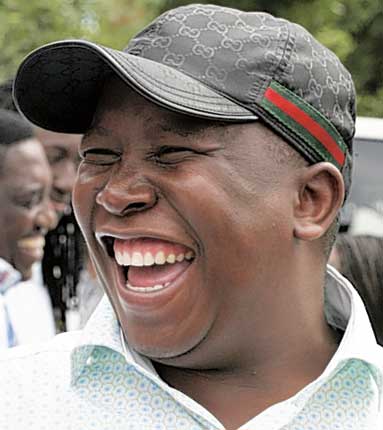ANC youth leader becomes liability for President Zuma

He is the sorcerer's apprentice of South African politics. But deluged by a flood of damaging allegations, the African National Congress (ANC) Youth League leader Julius Malema suddenly faces the prospect that the sorcerer, President Jacob Zuma, will not wave his saviour's wand this time.
Mr Malema is the 30-year-old rhetorical revolutionary who terrifies white South Africans as much as his hero, the Zimbabwean President Robert Mugabe. In 2009, he said he would "kill for Zuma'' and went on to garner huge support for the ANC in the general election. He claimed the woman who accused Mr Zuma of a rape – in a case that was dismissed in court in 2006 – "probably enjoyed it''.
He has been convicted for "hate speech'' for chanting an anti-apartheid militants' song "Kill the Boer''. More recently, he has called for the nationalisation of South Africa's biggest employers, the mining industry. In June Mr Malema accused whites of "stealing land'' and called for expropriation without compensation.
But in the past fortnight the domestic worker's son from Limpopo Province seems to have lost his touch for bouncing back. Crucially, Luthuli House, the Johannesburg headquarters of the ANC, has stopped issuing statements in his defence.
The unravelling began when the opposition Democratic Alliance pointed out that while earning R25,000 (£2,300) a month and promoting himself as the champion of the poor, Mr Malema is building an expensive house. They called for him to be subjected to a lifestyle audit. "Juju", as he is known, said that the matter was private. One newspaper, the City Press, reported Mr Malema's purchase of a house on its front page yesterday under the headline "Mister Cash".
The City Press has also survived an attempt by Mr Malema to prevent it from revealing the existence of the Ratanang Family Trust, named after his five-year-old son. A judge ruled that Mr Malema is a public figure and therefore open to scrutiny. The paper described the trust as like a wishing well into which businesses who want government tenders drop gifts to win contracts. City Press found one businessman who claimed to have paid R200,000 into it.
Mr Malema's press conferences are often displays of rhetorical fireworks and racial excess. But uncharacteristically, Mr Malema did not initially turn up to defend the Ratanang Family Trust. Instead, he handed a script to the Youth League secretary general Sindiso Magaqa, who said "it's a private matter".
The Youth League also tried to deploy some Malema-like invective against the white owners of City Press, the Naspers group, Absa Bank and other "capitalist imperialists" linked to the shady apartheid-era "Broederbond".
It was only on Thursday that Mr Malema denied any wrongdoing and told journalists that the Ratanang Trust is a charity that buys wheelchairs and school transport for "the poorest of the poor".
Observers are divided over how the debacle will end and whether Mr Zuma could sack him. Two years into his presidency, Mr Zuma is perceived as weak because he owes too many favours to the wide range of people he enlisted in his campaign to unseat Thabo Mbeki at the helm of the ANC in 2007. The last fortnight has seen a gold miners' strike and unemployment hitting a new high. Mr Malema's arch-enemy in the ANC is its influential secretary-general, Gwede Mantashe, who is also chairman of the South African Communist Party. Last year, after Mr Malema was booed at a Communist Party conference, he called for Mr Mantashe to resign.
But many political commentators argue that the ANC still needs Mr Malema because he provides the party's radical shopfront. He goes canvassing in desperately poor townships still without promised services and where mainstream politicians fear to tread.
Chris Moerdyk, a media commentator, said despite the setbacks, "Brand Malema" was still scoring on all fronts: "His primary objective is to ensure that the ANC stays in power. His role is crucial because 60 per cent of voters are under 30 and roughly 20 per cent of the entire voting public consists of unemployed, largely uneducated young black people with no hope in sight."
Join our commenting forum
Join thought-provoking conversations, follow other Independent readers and see their replies
Comments